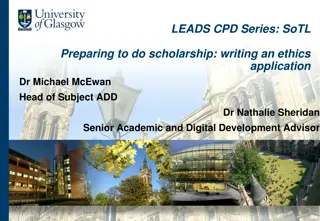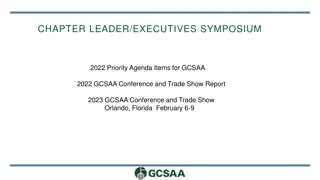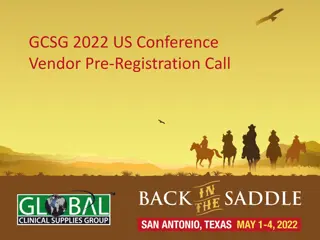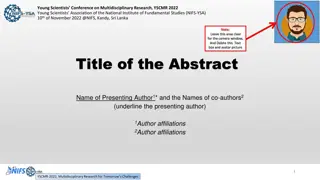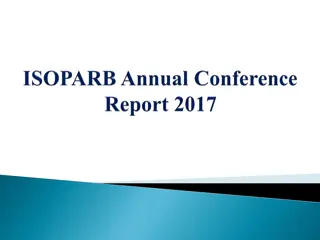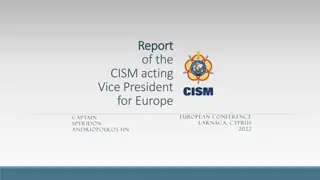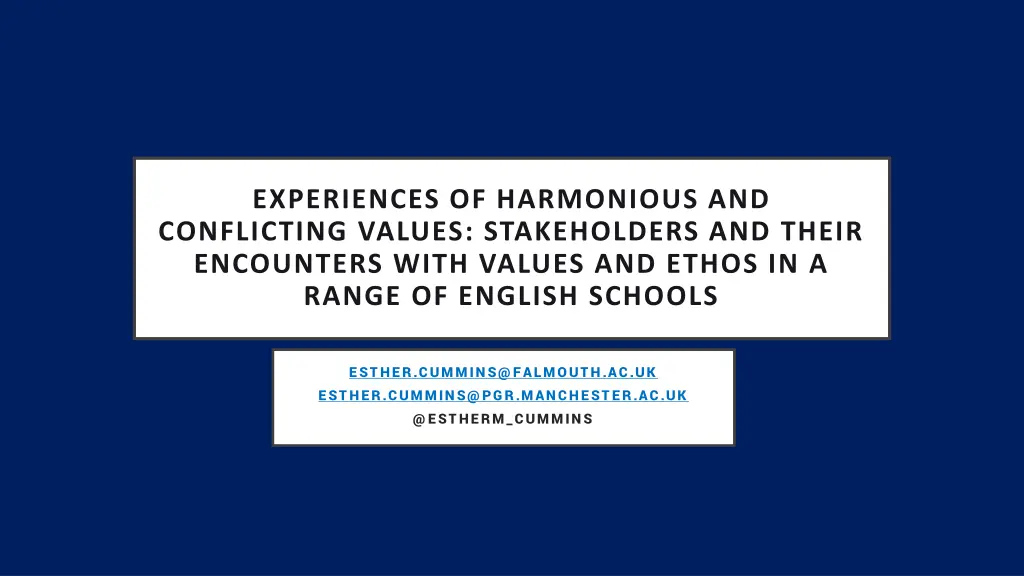
Encounters with School Values: Exploring Ethos and Stakeholder Perspectives
Explore the dynamics of harmonious and conflicting values in English schools through stakeholders' encounters with ethos and values. Understand how individuals perceive and navigate the ethos of their school environment, especially when it differs from their personal values. Dive into the role of ethos in shaping the organizational culture and relationships within school settings.
Download Presentation

Please find below an Image/Link to download the presentation.
The content on the website is provided AS IS for your information and personal use only. It may not be sold, licensed, or shared on other websites without obtaining consent from the author. If you encounter any issues during the download, it is possible that the publisher has removed the file from their server.
You are allowed to download the files provided on this website for personal or commercial use, subject to the condition that they are used lawfully. All files are the property of their respective owners.
The content on the website is provided AS IS for your information and personal use only. It may not be sold, licensed, or shared on other websites without obtaining consent from the author.
E N D
Presentation Transcript
EXPERIENCES OF HARMONIOUS AND CONFLICTING VALUES: STAKEHOLDERS AND THEIR ENCOUNTERS WITH VALUES AND ETHOS IN A RANGE OF ENGLISH SCHOOLS ESTHER.CUMMINS@FALMOUTH.AC.UK ESTHER.CUMMINS@PGR.MANCHESTER.AC.UK @ESTHERM_CUMMINS
Exploratory questions What happens if a member of staff or a child joins a school that holds different values to their own? For example, the 33% of children in Catholic schools from a non-Catholic background [W]hen habitus encounters a social world of which it is the product, is like a fish in water : it does not feel the weight of the water and it takes the world about itself for granted (Bourdieu and Wacquant, 1992, p. 127). Ethos is a formal expression of the authorities aims and objectives for an organisation [and] [e]thos emanates from individuals and group interaction and in this sense is not that which is formally stated or documented but is a process of social interaction; it is not independent from the organisation but inherently bound up within it. (Donnelly 2000, pp135-6) How do individuals understand the ethos and values in their schools? Bourdieu, P. and Wacquant. L. (1992) An Invitation to Reflexive Sociology. Chicago: University of Chicago Press. Donnelly, C. (2000) In Pursuit of School Ethos, British Journal of Educational Studies, 48(2) pp134-154 Semi-structured interviews 9 participants in different settings: 5 school governor, 1 former school administrator, 1 former headteacher, 2 teachers
ETHOS IS A FORMAL EXPRESSION OF THE AUTHORITIES AIMS AND OBJECTIVES FOR AN ORGANISATION. (DONNELLY, 2000, P135) School as an institution Values/ ethos as a list on the wall Ethos as a constraint Attending Public image (Mc Keon, 2020), including marketisation (Bragg and Manchester, 2017; Christie and McKinney, 2017) Religious or civic purpose (Faas, Foster and Smith, 2018) Expectations of stakeholders- relating to academic standards (Mc Keon, 2020) Mission (Faas, Smith and Darmody, 2018)
ETHOS EMANATES FROM INDIVIDUALS AND GROUP INTERACTION AND IN THIS SENSE IS NOT THAT WHICH IS FORMALLY STATED OR DOCUMENTED BUT IS A PROCESS OF SOCIAL INTERACTION; IT IS NOT INDEPENDENT FROM THE ORGANISATION BUT INHERENTLY BOUND UP WITHIN IT. (DONNELLY, 2000, P136) School as a community Values/ ethos as relationships Ethos that encourages Belonging Lived and experienced (Faas, Smith and Darmody, 2018; Faas, Foster and Smith, 2018; Sai, 2017; Modin, Laftman and Ostberg, 2017). May focus on ethos in relation to very specific behaviours (in the case of Modin, Laftman and Ostberg, 2017, bullying).
I: whole day with the teachers and, and the governors where you were looking at vision and values, could you talk me through that a little bit, please?... So, you mentioned about having this HARMONIOUS VALUES AND ETHOS R: groups throughout the day and we talked about what words, you know, linked? What, what words do we associate with vision? What words do we associate with values? We sort of explored those sorts of discussions... Um, and I think one of our key things, I think, was love thy neighbour as thy self kind of that came out of it. Um, I think we sort of split off into various And if anybody, you know, needed somebody to hold each elbow and carry them then that's what we did. And that was just the ethos really Rachel, former headteacher, primary school Rebecca, foundation governor, Catholic primary school Because I just wanted to shape the way Cos I have a passion for education in the sense that I don t think your social circumstances should dictate where you go in future . And I believe that education s like a key that can open your mind no matter where your what your current situation is. Dolor, vice chair of governors, SEND and safeguarding, curriculum committee, inner city, Anglican primary school Well, it s interesting that, actually, if you go into the school, it s incredible how you wouldn t really know you, you certainly wouldn t have a clue who were the Catholics and who weren t the Catholics, you know what I mean. Rebecca, foundation governor, Catholic primary school
(When asked about ethos) There is, I can't remember. I honestly can't remember. I've been there for so many years and I still can't remember. I think it's just I think for the day-to-day stuff, it just gets forgotten. I'm sure the senior leadership people and everybody higher up would know . Fatimah, teacher, secondary academy CONFLICTING VALUES AND ETHOS I mean there have been the odd occasion when we ve had a governor who wouldn t be supportive enough, in our view, of the ethos and they asked them to resign. On one occasion he was sacked by the, er, the trustees, Thank you for what you ve done but, you know, you re not fulfilling what we asked and therefore goodbye. Daniel, governor, chair of governors, Catholic primary and secondary schools the school had, um, six, six values they, they were values that I, I could easily relate to the school have shifted away from those six values, to, to four new core ... I'm not as excited about those core values simply because I find them a little bit more abstract and a little less accessible... I find the old, the values that existed when I joined the school much more practical in terms of being able to say to the children, did you follow this value? Are you being open and honest when something goes wrong and being able to, to, um, kind of, uh, support their behaviour and development with those values. Michael, teacher, primary school There is a list of values, yes. But I don't know what they are off the top of my head . George, governor, Anglican primary school
FINDINGS SO FAR REMAINING QUESTIONS Are there some values that can be compromised and some that cannot? Some individuals looked to school as an academic endeavour, some as an education in the fuller sense There was frustration from individuals when they encountered values and ethos in settings that differed from their personal philosophies Can some individuals adapt to life out of the water ? How can teachers learn how to choose the right school to work in? In some instances, there was no clear harmony or discord, but rather an apathetic attitude towards the values How do we understand how our own values may align and misalign with those of a school? Some individuals chose to leave settings because of the difference in individual and imposed values For those of us no longer in school settings, do these findings apply to our settings?










